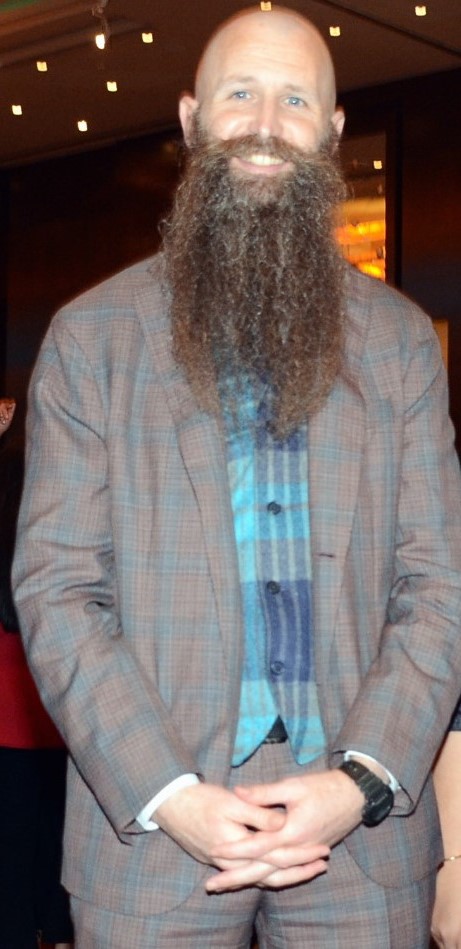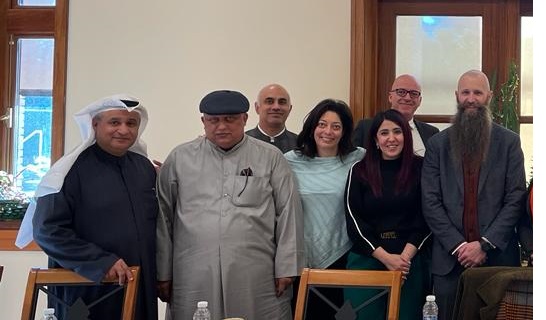Staff Report
In a media interview on the eve of the first anniversary of the start of the Russian invasion of Ukraine, the United States Chargé d’Affaires in Kuwait, James Holtsnider, denounced the invasion and compared Ukraine’s plight to that of Kuwait in 1990 when it was invaded and occupied by the Iraqi forces.
He went on to add, “This war is having catastrophic effects on the Ukrainian people and on the Russian economy. It has also disrupted food supply chains and food security all over the world. The invasion of Ukraine was a choice made by the Russian President Vladimir Putin, and he can end this situation and respect Ukraine’s territorial integrity and sovereignty, but I think, unfortunately, that President Putin is not interested in diplomacy.”
Pointing out that America had provided nearly $30 billion in assistance to Ukraine, and remain committed to supporting and defending the people of Ukraine, he added, “More than 50 countries met over the past few days within the Ukrainian Defense Contact Group, to talk about their support for Ukraine and the Ukrainian people, who have been subjected to atrocities for nearly a year. We will also hold talks about Ukraine again this week at the Munich Security Conference and in other meetings to come. There will be a focus and priority on ensuring international unity against Russia’s unprovoked invasion,” said the US diplomat.

He went on to note that “there is cooperation with a wide range of international partners, and I think we have to thank Kuwait for its principled position that it took in the United Nations. The Kuwaiti government co-sponsored the initial resolution condemning the invasion of Ukraine right after it happened last year, and then continued to sponsor and vote for UN resolutions condemning the unprovoked invasion.
Praising Kuwait’s “leading role in diplomatic and humanitarian activity around the world,” Mr. Holtsnider described the country as an “important diplomatic partner throughout the Arab world,” and added that “Kuwait has a very good reputation as an international mediator. Kuwait also provided humanitarian aid to the Ukrainian people, which is not surprising, given that Kuwait is renowned for its humanitarian support all over the world, and I think a lot of Kuwaitis sympathize with the Ukrainian people, given that they too went through such an experience.
“The only countries that support Russia are the same ones that cause problems all over the world, so one of the most disturbing things we’ve seen in recent months is cooperation between Iran and Russia. We’ve seen Iran’s destabilizing behavior in the past and now it is involved in export of weapons to Russia.
Noting that Germany, the United Kingdom, Italy and France, Australia, Canada, and the United States are all united in their opposition to what President Putin is doing in Ukraine, Mr. Holtsnider said, “We also share our concerns with our colleagues in Kuwait, especially with regard to troubling developments such as the export of Iranian weapons to Russia.”
Elaborating on the conflict between Russia and Ukraine, the US diplomat said: “Whatever differences the countries may have, whatever arguments they may have, diplomatic processes are available for talks to settle these issues, and to be able to address them through these talks, but unjustifiable use of force to violate internationally recognized sovereign borders and territories, and unnecessary and irresponsible attacks on millions of people, cannot be accepted.”
Expressing his belief that the sanctions imposed on Russia were working, Mr. Holtsnider said, “The aim of these sanctions is to make it clear to President Putin and the Russian government that this kind of behavior is not tolerated, and at the same time we want to properly protect other countries. So even as we put sanctions in place, we protect those countries that are at risk, particularly those in Africa and South America and parts of Asia, and I think President Joe Biden has been very clear about his desire to impose effective sanctions that also protect vulnerable populations in those countries.
“Sanctions are always complex. First, it takes some time to announce and then it takes longer to implement. But I have to say in my career and personal experience that sanctions have a huge impact, and for example, look at Iran. So, yes, I honestly think that the sanctions have already started to take effect and will continue with the unity of the international community.”
In response to a question about the possibility of an international military intervention, he explained: “We have consistently said that the Ukrainian people are fighting for their freedom and fighting bravely. And I think many people cannot believe that, a year after the invasion, Ukrainians were still able to survive the attacks of President Putin and the government.
“We’ve been very clear that we’re going to continue to provide the Ukrainians with resources so they can defend themselves. President Biden has also been very clear that we don’t have American troops in Ukraine and that these are Ukrainians fighting to defend themselves and their country from a horrible invasion.”
Expanding on Russia’s justification that its invasion of Ukraine was to stop the expansion of NATO towards Russian territory, Mr. Holtsnider said, “This is not an argument we agree with, and the only person who has strengthened and brought NATO closer to Russia recently is President Putin.” He described the Russian president’s justification as very similar to the arguments made by Saddam Hussein several years ago for his unjustified invasion of Kuwait.
Turning to US-Kuwait relations, Mr. Holtsnider first extended his congratulations to His Highness the Amir, the government and people on the occasion of national holidays, and pointed to the role of the United States of America and the coalition countries in liberating Kuwait and helping Kuwaiti citizens 32 years ago.
He also recalled that around 300 American soldiers sacrificed their lives while participating in the liberation of Kuwait, and that the martyrdom of these soldiers attested to the depth and strength of relations between the two countries as important partners. Pointing to the diversity of areas in which the two countries partnered and cooperated, Mr. Holtsnider indicated that these include,”defense, cyber security, economy, investment, information exchange, trade, and academics, in addition to the large number of students who receive their education in the United States”.
In response to a question about the date of the arrival of the new US ambassador to Kuwait, he said, “The ambassador has been named since last September 2022, and she is an ambassador with great diplomatic experience who served in a number of Arab countries. But the procedures for her appointment took longer as a result of the elections in the US at the end of 2022. She was renamed in January this year and we await her arrival in the near future.”

















